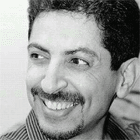Index relies entirely on the support of donors and readers to do its work.
Help us keep amplifying censored voices today.
 Prominent Bahraini activist Abdulhadi Alkhawaja is now entering his 63rd day of hunger strike. Index joins rights organisations, politicians and academics in calling on Bahrain’s ruler, King Hamad to release him immediately
Prominent Bahraini activist Abdulhadi Alkhawaja is now entering his 63rd day of hunger strike. Index joins rights organisations, politicians and academics in calling on Bahrain’s ruler, King Hamad to release him immediately
(more…)
Increased anger within Bahrain’s opposition over the continued detention of well-known activist Abdulhadi Alkhawaja has renewed concerns over whether Formula 1’s organising body should allow the controversial race to go ahead on 20-22 April.
Over the weekend, F1 teams expressed safety concerns, and called on the Fédération Internationale de l’Automobile (FIA) to postpone the race. Last week, former champion driver Damon Hill also called on the body to reconsider the race. Hill said that it would be “bad for Formula 1, to be seen to be enforcing martial law in order to hold the race” and that allowing the race to continue “could be creating more problems than it’s solving.”
However, Bahraini officials have dismissed reports that the race will be canceled. Bahrain International Circuit (BIC) chief executive Shaikh Salman bin Isa Al Khalifa told the Gulf Daily News that “the race is going ahead — there is no doubt about that”.
FIA has only said that it is “monitoring” the situation, but some believe that a contingency plan already in place could mean that a decision to cancel could be made as late as this weekend.
Despite repeated calls for Alkhawaja’s release from international rights organisations and the Danish government, the activist remains in prison. Bahrain’s Supreme Judiciary Council on Sunday rejected a request from the Danish government to transfer the activist, who has Danish citizenship. According to the state-run Bahrain News Agency, officials denied the handover because Bahraini law does not allow for “accused and convicted persons” to be transferred to another country.
Activists and family members have expressed concerns over Alkhawaja’s deteriorating health, as he is now entering his 62nd day on hunger strike. His daughter Zainab told Al-Jazeera that her father sounded “weak” when she spoke to him on the phone on Saturday. Mary Lawlor, executive director of Front Line Defenders, said that the activist is “at serious risk of imminent organ failure”. She reported that he has “shed 25 per cent of his body weight.”
Family members and officials have been unable to see Alkhawaja since 7 April, leading Alkhawaja’s lawyer to speculate that his client might already be dead. Danish Ambassador Christian König Feldt has also been denied permission to visit the activist. Despite alarming reports, Bahraini officials are denying that Alkhawaja’s health is deteriorating. They have said that he can converse normally and is “in good health.”
The UN has urged Bahrain to reconsider transferring Alkhawaja to Denmark on humanitarian grounds.
Following the government’s decision to reject the transfer of Alkhawaja, tensions have flared within Bahrain’s protests. On Monday, a blast from a homemade bomb during a protest for Alkhawaja in the village of Eker resulted in the wounding seven Bahraini policemen.
A TV cameraman has been shot dead near the Lebanon–Syria border. Ali Shaaban, from Lebanese TV channel Al-Jadeed, is believed to have been in northern Lebanese region of Wadi Khaled when Syrian soldiers opened fire on a car carrying Al-Jadeed staff. Shaaban’s colleague Hussein Khreiss said that the soldiers fired at the car, even though the crew made it clear they were not military. Prime Minister of Lebanon Najib Mikati deplored the incident, and said he would ask Syria to investigate the shooting.
Unidentified gunmen have brutally murdered a Somalian radio journalist. Mahad Salad Aden, a well known and well respected journalist for Shabelle Media Network, was murdered on 5 April at around 5.30pm by a group of masked men. This attack is the fourth of its kind against journalists affiliated with the Shabelle Media Network, and Adan is the fourth journalist to be killed in Somalia this year. Shabelle Media believe that such attacks are carried out by “certain groups across the warring factions in Somalia” in an attempt to force the network to serve their political objectives.